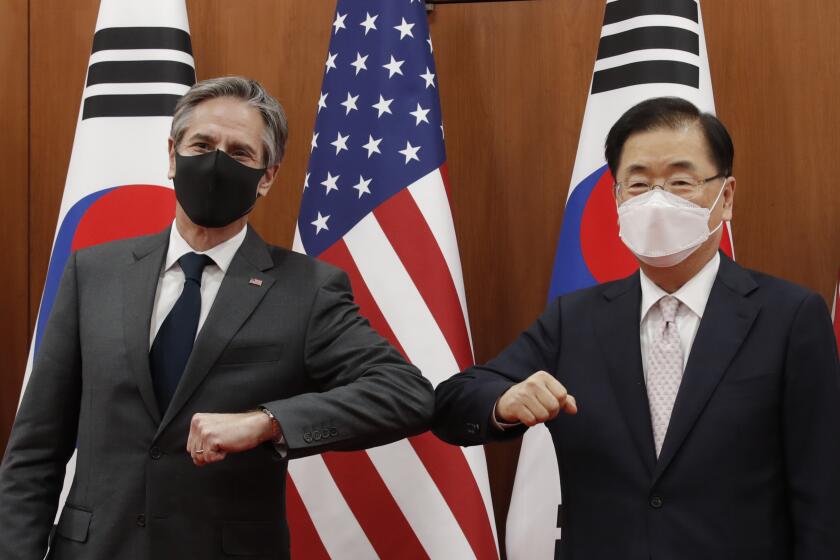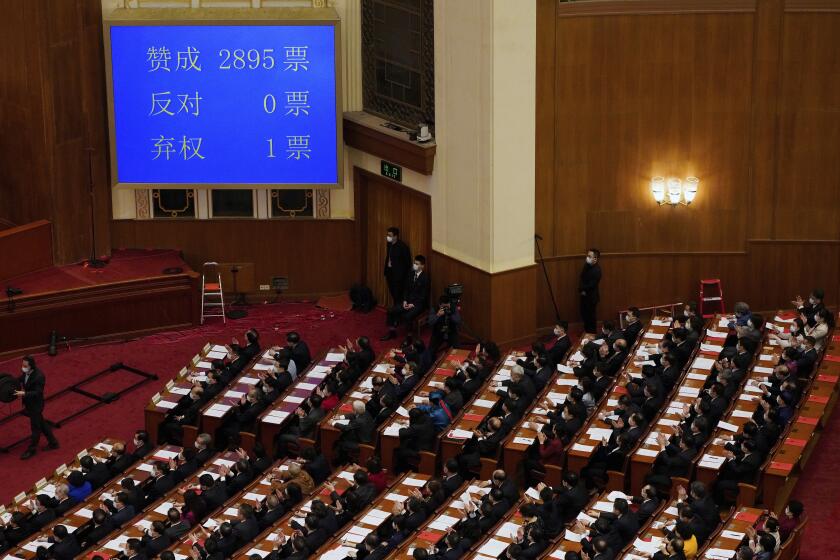The first China-Biden administration talks are over. It was a markedly acrimonious start
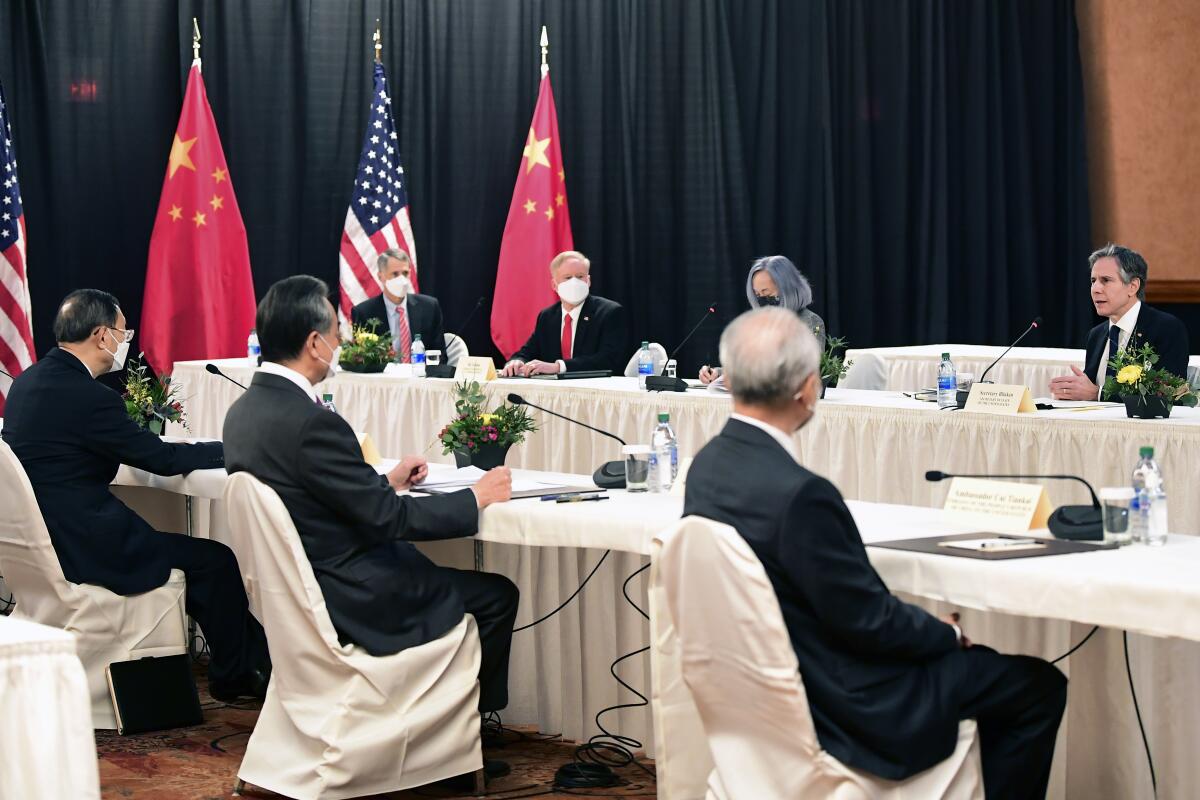
- Share via
WASHINGTON — President Biden is attempting to reconfigure the frayed U.S. relationship with China to be both competitive and cooperative. His administration is off to a rocky start.
In two days of talks that concluded Friday in Anchorage, two of Biden’s most senior officials traded barbs with their Chinese counterparts and failed to show any signs of agreement on numerous outstanding issues, from trade to human rights.
“We knew going in, there are a number of areas where we are fundamentally at odds,” Secretary of State Antony J. Blinken said Friday after the tense meetings ended. “It’s no surprise when we raised these issues clearly and directly, we got a defensive response.”
He described the first face-to-face talks of the Biden administration with China as “very candid” and “expansive.”
In Washington, Biden said he was satisfied with the meetings despite the frigid and sometimes rambunctious tone.
“I’m very proud of the secretary of State,” Biden said at the White House on Friday as he departed for Atlanta.
White House deputy spokeswoman Karine Jean-Pierre also sought to downplay what she called “exaggerated diplomatic presentations” by Chinese officials. “We knew this was going to be a tough discussion, a frank discussion ... but we’re still moving towards diplomacy, and that is the goal here,” she told reporters aboard Air Force One en route to Atlanta.
The Chinese were less sanguine.
“When the Chinese delegation arrived in Anchorage, their hearts were chilled by the biting cold as well as the reception by their American host,” Zhao Lijian, one of China’s famed Wolf Warriors, so-named for their practice of aggressive diplomacy, said Friday at a news conference in Beijing.
The state-owned Global Times, while advocating for cooperation between the world’s two largest economies, also hit a note of caution in an editorial Friday: “The U.S. should stop pretending that they can point a finger at China. That era is over.”
The scene in Alaska was quite a departure from the usual polite, anodyne opening meet-and-greet. Instead, the representatives launched into mutual recriminations in surprisingly undiplomatic exchanges, each side offering a diametrically opposed vision of the other’s country and place in the world.
Blinken quickly and pointedly listed several of Beijing’s policies the U.S. sees as egregious, including China’s harsh repression of Muslim Uyghurs, cyberattacks on the U.S. and aggression against Taiwan, actions that “threaten the rules-based order that maintains global stability.”
“That’s why they’re not merely internal matters and why we feel an obligation to raise these issues here today,” Blinken said at the start of talks on Thursday.
Secretary of State Antony Blinken’s Asia diplomacy aims to rebuild alliances ahead of the Biden administration’s first face-to-face talks with China.
The head of the Chinese delegation, Communist Party foreign policy chief Yang Jiechi, launched into a long rebuttal, extolling the virtues of what he called Chinese-style democracy and respect for human rights and dismissing “what is advocated by a small number of countries of the so-called ‘rules-based’ international order.”
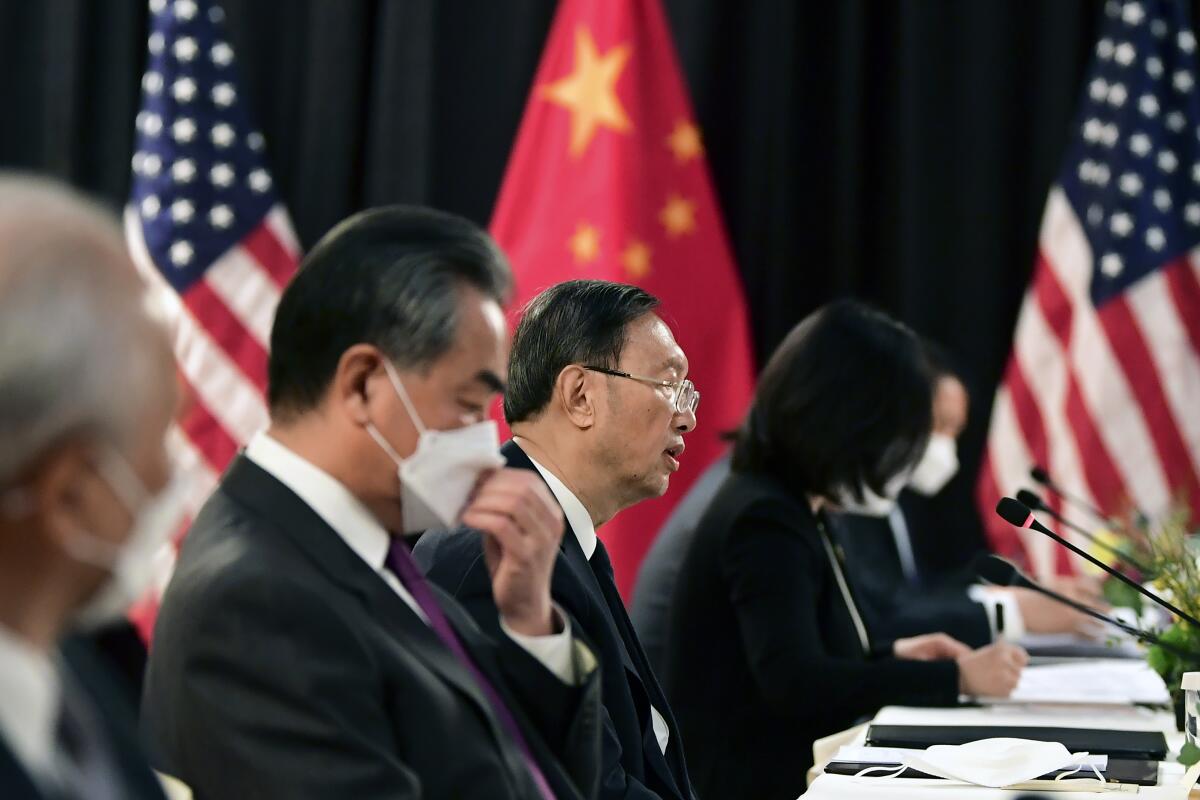
Yang attacked the United States’ own human rights record and its domestic turmoil over racism, violence and other problems. He said polls showed that Americans have many doubts about their democracy, and claimed that Chinese leaders remain hugely popular with their people. And he called on the United States to stop attempting to export its version of democracy.
“The challenges facing the United States in human rights are deep-seated,” Yang said. “They did not just emerge over the past four years, such as Black Lives Matter. It did not come up only recently. So we do hope that for our two countries, it’s important that we manage our respective affairs well instead of deflecting the blame on somebody else in this world.”
China approves plans to exert more power over Hong Kong, compete with the U.S. in technology and bolster Mandarin-language education.
Foreign Minister Wang Yi followed in similar fashion, attacking the U.S. for imposing new sanctions on Chinese officials on the eve of the Anchorage meeting, as punishment for infringing on the rights of Hong Kong citizens.
Blinken shot back that unlike China, the U.S. “acknowledges our imperfections” and confronts “those challenges openly, publicly, transparently, not trying to ignore them, not trying to pretend they don’t exist, not trying to sweep them under a rug.”
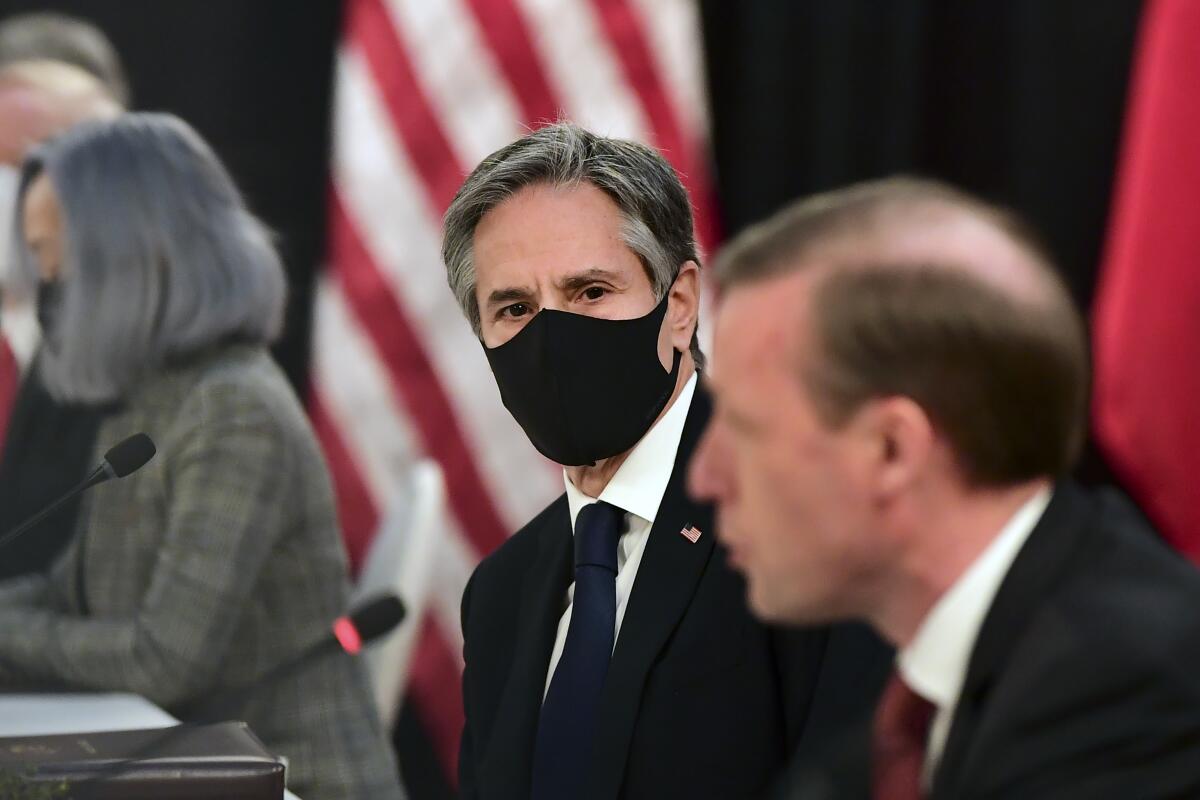
As the exchanges grew more heated, the Chinese officials drummed their fingers on the table while the U.S. delegates furiously passed scribbled messages to one another.
Several times, organizational staff tried to pull reporters from the meeting, only to be ordered by the American or Chinese leaders to remain as they yet again responded to the opposing side’s comments.
Later, the U.S. delegation took the unusual step of criticizing the Chinese officials for violating protocol by speaking long beyond the agreed-to two-minute statements. The Chinese delegation “seems to have arrived intent on grandstanding, focused on public theatrics and dramatics over substance,” a senior Biden administration official said on condition of anonymity in keeping with bureaucratic rules.
Under President Trump, relations between Washington and Beijing plummeted after he initially shared a very friendly relationship with China’s President Xi Jinping. Trump blamed China for spreading the coronavirus worldwide, hit Chinese products with high tariffs and imposed economic sanctions on a wide range of Chinese individuals and companies as punishment for trading with Iran, helping North Korea and mistreating its minorities.
In its final days, the Trump administration labeled Chinese repression of the Uyghurs a genocide. The Biden administration has concurred with that assessment. But it also has expressed confidence that it could confront China with “stiff competition” — as Biden national security advisor Jake Sullivan, who also attended the Alaska meetings, put it — while cooperating on climate change and global health crises.
Times staff writer Chris Megerian aboard Air Force One contributed to this report.
More to Read
Get the L.A. Times Politics newsletter
Deeply reported insights into legislation, politics and policy from Sacramento, Washington and beyond. In your inbox twice per week.
You may occasionally receive promotional content from the Los Angeles Times.
